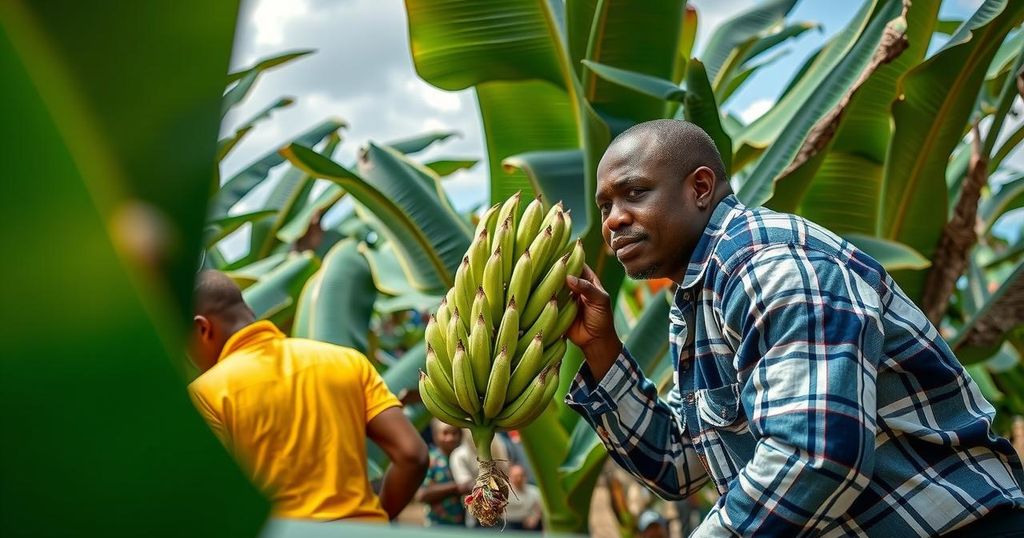Ahumwire Justine, a banana farmer in Uganda, faced destruction of her crops and livestock due to extreme weather, underscoring the vulnerability of farmers to climate change. The NDC Action Project, initiated by UNEP, provides crop insurance and training in digital technology to enhance farmers’ resilience. This program aims to help the farming community cope with unpredictable weather patterns while ensuring their economic stability. Plans to expand the initiative promise to cover more farmers, offering peace of mind and financial security.
Ahumwire Justine, a banana farmer from Shuku in southwestern Uganda, experienced the devastation of extreme weather firsthand last October when a violent rain and hailstorm obliterated 300 of her banana trees and resulted in the loss of two of her cows. Faced with significant damage that left her family in dire straits with no food or means to pay for school fees, Justine’s situation highlights the growing vulnerability of farmers in Uganda due to climate change. Reports from the Intergovernmental Panel on Climate Change indicate that such intense storms are becoming increasingly frequent and severe. In response to the challenges posed by climate change, the NDC Action Project, a collaboration between the United Nations Environment Programme (UNEP) and the UNEP Copenhagen Climate Centre, aims to provide a safety net for farmers like Justine. “We know farmers, particularly smallholders, are struggling to adapt to the effects of the climate crisis,” stated Mirey Atallah, Chief of the Adaptation and Resilience Branch within UNEP’s Climate Change Division. This initiative combines technical and financial tools to bolster the resilience of farmers against the catastrophic impacts of extreme weather events. Bananas are a cornerstone of Uganda’s agricultural sector, accounting for nearly half of the nation’s farmers in 2019, according to statistics from Uganda’s government. Beyond being a staple food source, bananas serve various purposes, including the use of their fibers for ropes and their leaves for packaging. However, the effects of climate change have rendered Uganda’s weather patterns unpredictable, significantly affecting farming operations. Florence Muranga, Director of the Banana Industrial Research and Development Centre, noted that farmers are now forced to contend with fluctuating growing seasons characterized by excessive rainfall followed by droughts. To tackle these issues, the Banana Industrial Research and Development Centre has played a pivotal role in facilitating access to crop insurance for farmers. The initiative has trained over 930 banana farmers to utilize smartphones to document their crops digitally. In the event of a storm, farmers can upload photos of the damage, which are then assessed by agroeconomists to ascertain compensation value. Remarkably, nearly half of the participants in this pilot training program are women. This technology transfer was facilitated by ‘Champion farmers’ who assist their peers in learning how to use smartphones effectively. Another significant partner, Agriculture and Climate Risk Enterprise Africa, links smallholder farmers with insurers through the Agro Consortium Limited, a coalition of 13 insurance companies. The integration of crop insurance with a digital platform leads to quicker payouts and reduced premiums, as it minimizes the need for on-site claims evaluations. Additionally, farmers receive training in water management and agroforestry, leading to increased productivity and diminished climate-related losses, thus lowering the insurance payout risk. The positive outcomes of this pilot project have led to plans for its expansion to encompass all 5,000 banana farmers represented by the Banana Industrial Research and Development Centre, with ambitions to ultimately serve 50,000 farmers throughout the nation. For Justine, the newfound insurance coverage translates to invaluable peace of mind, stating, “I know that if [my crops get damaged] I have help. It is not like in other years, where I would have to start from zero.”
The topic addresses the increasing vulnerability of Uganda’s banana farmers to extreme weather, exacerbated by climate change. The NDC Action Project, a collaboration between UNEP and UNEP-CCC, seeks to mitigate these risks through innovative insurance solutions tailored to the unique circumstances of smallholder farmers. Through training in digital agriculture practices and the implementation of crop insurance, this initiative aims to enhance the farmers’ resilience and financial stability against climatic disruptions, thus securing one of Uganda’s primary agricultural sectors.
The integration of digital technology in agricultural practices, coupled with innovative insurance solutions, demonstrates a proactive approach to bolstering the resilience of Uganda’s banana farmers against climate-related adversities. As showcased by Justine’s experience, these initiatives not only secure livelihoods but also instill a sense of hope and stability in communities heavily reliant on agriculture. With plans for wider implementation, there exists great potential to transform the agricultural landscape in Uganda, ensuring the sustainability and future of banana farming in the face of climate change.
Original Source: www.unep.org






